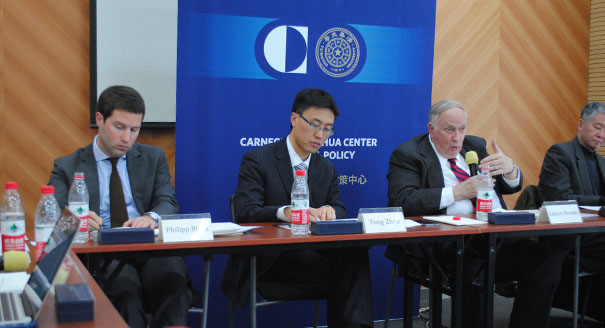Registration
You will receive an email confirming your registration.
China has begun developing submarines equipped with nuclear ballistic missiles to preserve the country’s nuclear second-strike capacity and bolster the credibility of its deterrence. The United States and other regional powers perceive Beijing’s emerging at-sea deterrent capability as a security challenge and are consequently revitalizing their antisubmarine capabilities in waters nearby China. U.S. efforts to undermine the survivability of Chinese nuclear submarines and related attempts to track Chinese vessels heighten the chances of confrontation between surface ships and aircraft. Responsibly managing maritime tensions has thus become a pressing strategic matter.
Tong Zhao hosted a panel with U.S. and Chinese defense and security experts to discuss these issues and explore bilateral possibilities for building confidence and reinforcing strategic stability.
Discussion Highlights
- Dimensions of Strategic Stability: While countries generally agree that strategic stability is desirable, there is no shared definition of the term even among U.S. policy experts, participants said. They emphasized the distinction between balanced conditions at the nuclear level and at the sub-nuclear level of conventional military action. Different states may not value stability equally, although virtually all countries share a general interest in avoiding nuclear escalation, they added.
- Capabilities and Usage of Nuclear Submarines: Panelists stressed that nuclear-armed submarines are not unequivocally conducive to strategic stability. Rather, such vessels affect stability based on their capabilities and usage. Participants observed that more advanced, quieter models are better able to avoid surveillance efforts and thus are less vulnerable. The range of missile payloads also impacts the geographical range in which submarines can operate. Finally, panelists noted that the frequency and scope of a country’s submarine operations in international waters also affects the strategic dimensions of naval capabilities and implications for strategic stability.
- Lessons from Cold War Submarine Deployment: Participants pointed out that although nuclear-armed submarines are a new direction for Chinese naval forces, U.S.-Soviet interactions between such vessels during the Cold War provide important insights. They observed that the Soviets deployed limited numbers of nuclear submarines, which tended to remain in or near Soviet waters where other navy vessels could protect them. By contrast, the U.S. Navy kept far more nuclear submarines spread across international waters to maximize their deterrent capabilities. Participants noted that it remains to be seen how China will operate its nuclear submarine fleet.
- Stable Command and Control Channels: Aside from concerns of capability and use, the structure of command and control networks is also relevant to how sea-based nuclear missiles impact stability, panelists said. They noted that chains of command must be survivable to preserve a country’s second-strike capacity and maintain stable deterrence. They also agreed that nuclear command structures should be separate from those of conventional forces to minimize the likelihood of conventional escalation crossing the nuclear threshold.
- Prospects for Confidence-Building: Participants agreed that although Beijing and Washington both want to enhance trust about maritime nuclear capabilities, achieving concrete proposals acceptable to both sides is a formidable challenge. They suggested that unsuccessful past proposals to limit the geographic scope of nuclear submarine activity, or to establish sea zones free from anti-submarine capabilities, lacked clear verification procedures. Panelists did, however, suggest that shared naval exercises and unofficial bilateral Track II discussions are constructive means of building confidence.
Linton Brooks
Linton Brooks is a senior adviser for the Center for Strategic and International Studies’ Project of Nuclear Issues and a distinguished research fellow at the National Defense University.
Philipp Bleek
Philipp Bleek is a fellow at the Center for Nonproliferation Studies and an assistant professor at the Middlebury Institute of International Studies at Monterey.
Gu Guoliang
Gu Guoliang is a retired senior research fellow at the Chinese Academy of Social Sciences (CASS) and previously was deputy dean of the Institute for American Studies.
Hu Yumin
Hu Yumin is vice secretary general and a senior research fellow at the China Arms Control and Disarmament Association.
Fan Gaoyue
Fan Gaoyue is a retired senior colonel in the People’s Liberation Army (PLA) and former director of the Department of Foreign Military Studies of the PLA Academy of Military Science.
Fan Jishe
Fan Jishe is a senior research fellow at CASS and director of the strategic studies department of the Institute for American Studies.
Han Hua
Han Hua is an associate professor at Peking University and director of the Center for Arms Control and Disarmament in the university’s School of International Studies.
Tong Zhao
Tong Zhao is an associate in Carnegie’s Nuclear Policy Program based at the Carnegie–Tsinghua Center for Global Policy.
